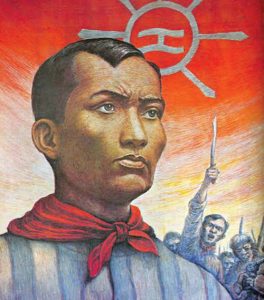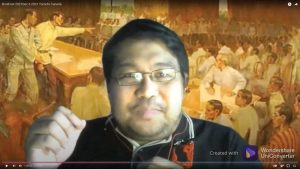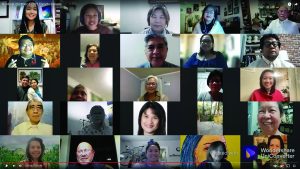BoniFest 2021: Tejeros Convention a coup d’etat vs Bonifacio — historian
BoniFest 2021: Tejeros Convention a coup d’etat vs Bonifacio — historian

ANDRES BONIFACIO
By Lea Luciano
The Philippine Reporter
In commemoration of Andres Bonifacio’s 158th birthday, BoniFest 2021 draws a parallel between the forthcoming 2022 election and the Tejeros Convention in 1897.
This online event was held on December 6, 2021, and organized by Filipino Canadian Writers and Journalists Network (FC-WJNet) and Malaya Movement.
“We should create new narratives now,” Prof. Michael Charleston “Xiao” B. Chua said when he discussed the topic “Tejeros and the 2022 Elections: Lessons in Betrayal and Treachery” and its significance in the current political climate in the Philippines.
Hermie Garcia of The Philippine Reporter introduced Prof. Chua as an “extraordinary historian” and history lecturer at De La Salle University-Manila.
His role as a public historian is to bring history closer to the masses and “to serve as the bridge to academic historians and the public,” Garcia said.
“The Tejeros Convention was a concerted coup d’etat to get the leadership from Andres Bonifacio, the legitimate leader of the revolution,” Prof. Chua said.

Prof. Michael Charleston “Xiao” B. Chua
The Tejeros Convention was held on March 22, 1897, where revolutionary leaders gathered in Cavite to discuss their defense against the Spaniards and to decide what type of government should be installed.
Andres Bonifacio presided over the election with the agreement that the will of the people would be respected no matter what the outcome was.
Emilio Aguinaldo won as president, and there was a suggestion that Bonifactio should take on the role of Vice-President since he garnered the second highest number of votes, but this was not carried.
When Bonifacio was finally elected Director of the Interior, Daniel Tirona protested saying the former was unfit to take on the position owing to his lack of credentials and not being a lawyer.

Part of the participants at the Zoom meeting.
Bonifacio was vexed not so much by the attack on his credentials but rather due to the lack of process, as he had emphasized that the will of the majority must be respected at all costs. Bonifacio still believed at the start of the Tejeros Convention that the democratic process would prevail, and this was his biggest mistake, Prof. Chua said.
Bonifacio declared the election results null and void and signed, along with other Katipuneros, a document called the Acta de Tejeros, which proclaimed the events of the assembly to be disorderly and tarnished by chicanery.
There were already allegations of cheating during the first election when Aguinaldo won the election for president. According to one of Bonifacio’s comrades, there were more ballots than voters, and some ballots were pre-filled with names before the election had even commenced.
There was also election-related violence in the execution of the Bonifacio brothers who had affirmed their steadfast devotion to the Katipunan ideals. Bonifactio was tried for treason by a kangaroo court and sentenced to death.
According to Prof. Chua, Andres Bonifacio wanted to demonstrate his ability to be democratic, but in the end, he was betrayed by two of his supporters. He also pointed out the two main flaws of Filipinos that are present during the Tejeros Convention and the upcoming elections.
“Elitism is ripe in today’s politics because sometimes when we look at the [masses] bayan and we do not agree with their choices, sometimes we call them Bobotante,” he said. “We blame their lack of education for their decisions, electoral and political decisions.”
As lovers of democracy, we need to understand why they support certain leadership and candidates. Daniel Tirona’s elitism towards Andres Bonifacio destroyed the unity of their party when he questioned his educational attainment.
“We have to respect the intelligence of the people. We may not agree with them sometimes, but we must respect them.”
Prof. Chua pointed out that Filipinos tend to argue and fight among themselves.
“Instead of having the struggle for those who are fooling us, corrupting us, and our government, it’s the supporters fighting each other.”
History is repeating itself with the current political state of our country. Prof. Chua said that “we should learn from history, but we should not be trapped by it. We remember the past but we do not live in the past.”
“I hope that we are going to choose leaders who have a clear definition of how they are going to cooperate with other countries. That’s what we need to see.”
Comments (0)